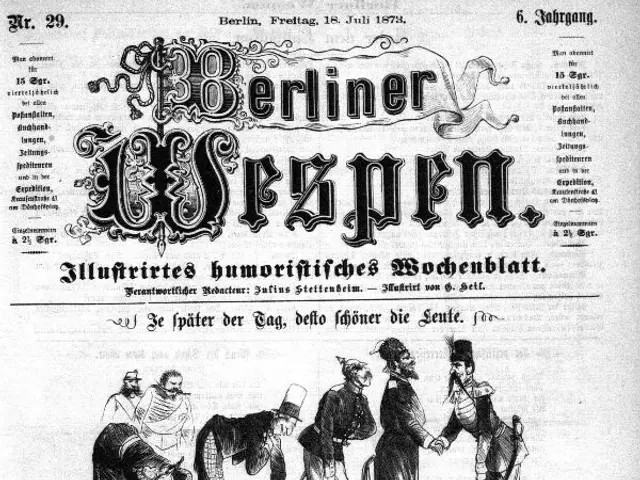Warnings Issued About Integration Officer's Concerns Over Developing Independent Structures in Neukölln
In the district of Neukölln, Berlin, a growing concern over increasing gender separation has been raised by Güner Yasemin Balci, the Integration Commissioner of the area[1]. According to Balci, this trend is driven by social and cultural pressures that are marginalizing women, pushing them back in public and community spaces[1].
The roots of this issue can be traced back to the 1980s, when Balci observed the beginnings of gender separation with the influx of Palestinian families from Lebanon[1]. This development has been further influenced by a growing patriarchal culture, which has gained prominence with the influx of certain communities[1].
One of the concerning aspects highlighted by Balci is the gender separation in kindergartens under construction, which are associated with a mosque association that falls under the Shia-conservative spectrum[1]. Some imams in Neukölln have also been reported to offer marriage counseling for 14-year-old girls and find it acceptable for a man to take a second wife[1].
Balci has also criticized the handling of Islamist supporters by authorities and warned that our tolerance could still be our downfall[1]. She has suggested that politics should use all legal means to oppose far-right parties like the AfD, including a party ban if necessary, due to the potential threat they pose to democracy[1].
The district of Neukölln, home to approximately thirty mosques, has seen an increase in the number of conservative mosques[1]. In this environment, girls were largely invisible and only seen when they performed domestic tasks or shopping with their mothers[1]. Some boys in this community dominated public space and were often stateless, without school obligations, and without prospects[1].
To address this issue, efforts are being made through public discourse, awareness raising, and initiatives led by local authorities and civil society. Balci's public identification of the problem is a critical step towards policy and community response[1]. Community activities and workshops on gender, institutions, and social fragility, such as those scheduled in Berlin later in 2025, can provide academic and policy insights to tackle such challenges more broadly[3].
In conclusion, the increasing gender separation in Neukölln is a complex issue arising from societal changes impacting women’s roles and public presence, with tangible negative effects on gender equality. Local leaders like Balci are vocal about the problem, initiating public awareness and engagement as foundational efforts to counteract this trend[1][3].
- The lifestyle in Neukölln, Berlin, has been influenced significantly by gender separation, a growing concern raised by Güner Yasemin Balci, the Integration Commissioner of the district.
- Social and cultural pressures, as Balci suggests, are playing a crucial role in marginalizing women in public and community spaces in Neukölln.
- The roots of this gender separation can be traced back to the 1980s, when Balci observed the beginnings of this trend with the influx of Palestinian families from Lebanon.
- This issue has been further shaped by a growing patriarchal culture that has gained prominence with the influx of certain communities in Neukölln.
- One of the concerning aspects is the gender separation in kindergartens under construction, associated with a mosque association that adheres to the Shia-conservative spectrum.
- Some imams in Neukölln have been reported to offer marriage counseling for 14-year-old girls, and find it acceptable for a man to take a second wife.
- Balci has criticized the handling of Islamist supporters by authorities and has warned that our tolerance could be our downfall.
- She has advocated for politics to use all legal means to oppose far-right parties like the AfD, including a party ban if necessary.
- The district of Neukölln, known for its numerous mosques, has seen an increase in the number of conservative mosques in recent years.
- In this environment, girls in Neukölln are largely invisible and only seen when they perform domestic tasks or shopping with their mothers.
- Some boys in the community, stateless and without school obligations, dominate public spaces and lack prospects.
- To counteract this trend, efforts are being made through public discourse, awareness raising, and initiatives led by local authorities and civil society.
- Balci's public identification of the problem is considered a critical step towards policy and community response.
- Community activities and workshops on gender, institutions, and social fragility can provide academic and policy insights to tackle such challenges more broadly.
- The increasing gender separation in Neukölln has negative effects on gender equality, as it significantly impacts women's roles and public presence.
- Sports such as football, baseball, hockey, golf, and basketball, along with mixed martial arts and racing, have no direct connection to the issue but can serve as a distraction from the ongoing concern in Neukölln.
- European leagues like football's Laliga or tennis competitions may continue their events in 2025 during community workshops in Berlin, providing a platform for local leaders to discuss and address gender separation and other issues in the district.





